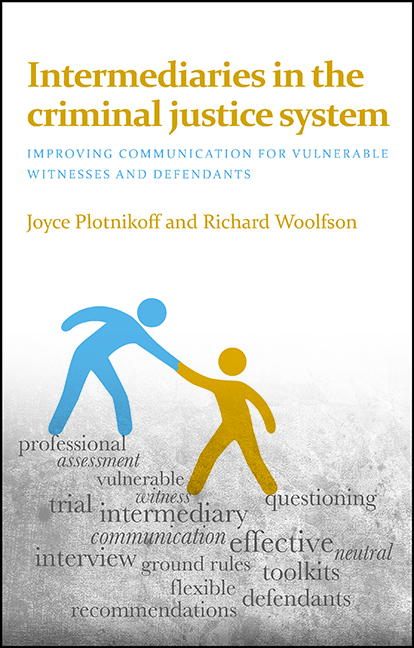 Intermediaries in the Criminal Justice System
Intermediaries in the Criminal Justice System Book contents
- Frontmatter
- Contents
- About the authors
- The Nuffield Foundation
- Acknowledgements
- Foreword
- one Introduction: a fresh pair of eyes
- two The intermediary scheme in England and Wales
- three Behind the scenes: planning to assess the witness
- four Assessment methods and involvement of the interviewer
- five Communication aids and stress reduction strategies
- six Contributing to the effectiveness of the police interview
- seven Negotiating professional space at the ground rules hearing
- eight Making the ground rules hearing effective
- nine ‘Every reasonable step’: preparation for giving evidence
- ten Cross-examination: research, case law, training and regulation
- eleven Cross-examination: intervention at trial
- twelve Cross-examination: challenges at the cutting edge
- thirteen The uneasy position of vulnerable defendants
- fourteen A new profession
- fifteen Conclusion
- References
- Index
- Table of cases
- Legislation
- Rules
- Practice directions
four - Assessment methods and involvement of the interviewer
Published online by Cambridge University Press: 08 March 2022
- Frontmatter
- Contents
- About the authors
- The Nuffield Foundation
- Acknowledgements
- Foreword
- one Introduction: a fresh pair of eyes
- two The intermediary scheme in England and Wales
- three Behind the scenes: planning to assess the witness
- four Assessment methods and involvement of the interviewer
- five Communication aids and stress reduction strategies
- six Contributing to the effectiveness of the police interview
- seven Negotiating professional space at the ground rules hearing
- eight Making the ground rules hearing effective
- nine ‘Every reasonable step’: preparation for giving evidence
- ten Cross-examination: research, case law, training and regulation
- eleven Cross-examination: intervention at trial
- twelve Cross-examination: challenges at the cutting edge
- thirteen The uneasy position of vulnerable defendants
- fourteen A new profession
- fifteen Conclusion
- References
- Index
- Table of cases
- Legislation
- Rules
- Practice directions
Summary
Unlike health settings, intermediaries have no standard approach to assessments for justice system purposes. It depends on the intermediary, the requirements of the case and the capabilities of the witness. The intermediary may conclude that the witness simply does not have the ability to give evidence, even with assistance.
Assessment is not always straightforward: some people are willing to discuss with the intermediary issues that affect them (one witness described herself as having “that bipolar bear thingy where you go up and down”) but many others have spent a lifetime covering up their communication and literacy difficulties, especially to anyone in authority. However, it is unusual for the offer of intermediary assistance to be declined.
Police officers, lawyers and judges often change in the course of a single case but, continuity of intermediary through assessment, interview and trial is important to ensure familiarity with the witness’s communication and establish trust. Assessment underpins intermediary recommendations about adapting questioning techniques and procedures at the police interview and at court. If a recommendation is challenged, intermediaries must be able to justify it based on their assessment findings. Intermediaries are not expert witnesses and their report is not part of the evidence, but they must keep notes of their assessment which could be disclosed at trial. In certain circumstances the assessment may be filmed, for example where a young child may make a spontaneous disclosure about the alleged offence or if the witness uses a communication method that must be demonstrated to be transparent.
This is how one intermediary who works with children explains her assessments in her court reports. The principles are of general application:
‘The activities are designed to quickly assess the witness’s communication, vocabulary and attention; her ability to understand language and question forms and to use language to describe and clarify; whether she is aware that others have knowledge that she does not have; and her ability to refute inaccurate suggestions. I also assess her ability to concentrate, attend and to manage her arousal [anxiety] levels; I try out approaches for keeping her calm and engaged and introduce “talking rules”, such as “don’t guess”.’
- Type
- Chapter
- Information
- Intermediaries in the Criminal Justice SystemImproving Communication for Vulnerable Witnesses and Defendants, pp. 39 - 54Publisher: Bristol University PressPrint publication year: 2015


